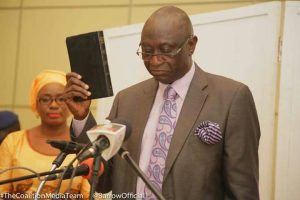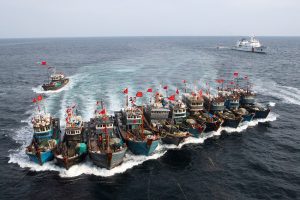By Kebba Ansu Manneh
Amid general outcry amongst Gambians about the fishing agreement signed between The Gambia Government and the European Union, James FP Gomez, the Minister for Fisheries, Water Resources and National Assembly Matters, has defended the agreement made in Belgium on Friday, 19 October 2018. This new agreement called Sustainable Fishing Partnership Agreement (SFPA) replaces an earlier agreement that expired twenty-two years ago.
“This new fisheries agreement allows EU vessels to fish in the Gambian waters and thus, extends the network of tuna fisheries agreements in West Africa. The new protocol covers a period of 6 years and will offer EU vessels the possibility to fish 3300 tons of tuna and tuna-like species as well as 750 tons of hake per year in the Gambian waters. In return, the EU will pay The Republic of The Gambia a financial contribution of 550 000 € per year. Half of this yearly contribution will be used to strengthen the sustainable management of fisheries resources and the development of the Gambian fishing sector,” according a statement released by the EU.
Many Gambians have criticized the agreement saying that this protocol, if ratified by the National Assembly, will give an unfettered access to European companies to fish in the Gambia’s territorial waters without equivalent accrued benefits to Gambians.
The average market price per ton of Whole Skipjack tuna fish in the European market is 1,200 €. At this prevailing average price, European vessel owners could gain up to 3,960,000 € for 3,300 tons of tuna, generating a annual profit of 3,410,000 € or 620 percent return on investment for the European fishing companies. This excludes any returns the European fishing companies will make on 750 tons of hake fish per year.
According to the Food and Agriculture Organization (FAO) figures in the European Price Report in March 2018, the price of a 300-400 graded Fresh-Gutted Merluccius Hake fish in the European market is 6.55 € per kilogram. At that price, the European vessels would be allowed to fish approximately 680,389 kilograms (750 tons) of Hake fish that would generate them about 4,456,548 € in revenue per annum. Altogether, the European fishing companies could generate approximately 7,867,000 € or 1,430 percent returns on investment per year. While at baseline The Gambia would receive 3,300,000 € for the period of six years under the contract, the European vessels and seafood companies could generate approximately 47,202,000 € in total revenues for the six-year period.

Given the fact that The Gambia has no surveillance and monitoring system in place to gather accurate data on catchment, many Gambians argued that this deal is not only a bad investment financially but will also crowd out the local fishermen from the industry.
Minister Gomez, however, disagreed with these arguments. According to him The Gambia has not, for more than two decades, benefited from the fishing industry.
“For twenty-two years we have not made a dime from our waters and this is the beginning and the best thing we (government) can do. What we love is to have our own factories in the country like it used to be before when we have the National Partnership Enterprise (NPE) and Lye Fishing Companies,” Minister Gomez said in defending the fishing agreement with EU.
Responding to the concerns raised by many Gambians that the agreement gives fishing trawlers and vessels flying EU flags to fish freely without hindrance, the Minister said: “I want you (The Times) to understand that it is not all the ships flying European flags that will come to our waters. We agreed on numbers. When they fish they report the catches. If they catch more than what we agreed, they pay us more. And if they don’t catch more they don’t pay us more, and we (government) don’t have to refund them for what they have paid.”
Mr. Gomez, however, admitted that the government is yet to have surveillance boats to patrol the territorial waters. He added that to safeguard against the possibilities of the country incurring losses, the government has reached an agreement with Darmian Shipyard Company to supply two patrol vessels. He revealed that these vessels acquired from Darmian Shipyard will arrive in the country by February of 2019.

Further defending government’s deal with the European Union, Mr. Gomez said the fact that tuna fish are migratory species the country has little or nothing to lose because fishermen in the tuna industry do not stay permanently in the territorial waters of one country.
Countering the claims that The Gambia will earn only 550,000 € per annum as stated in the agreement, Mr. Gomez said The Gambia could benefit up to 900,000 € per annum which would amount to 5.4 million Euros for the six-year period of the agreement. Mr. Gomez said that The Gambia would generate the additional revenue from the licensing fees that European fishing vessels and trawlers will pay for operating in the territorial waters of The Gambia.
He did not state under what scenario these numbers could be realized per year, or the number of European vessels that would be allowed to fish in the Gambian waters. However, even if the inflated figures were to be realized, given the nearly 7,000,000 € adjusted returns per annum on investment for the European fishing industry, this will still generate them more than 874 percent returns per annum.
Mr. Gomez also spoke about the political challenges the employees of the Ministry of Fisheries faced under the government of former president Yahya Jammeh. He accused the former regime for sending many technocrats of his department to jail in their struggle to protecting the territorial waters of The Gambia against illegal fishing by trawlers and vessels owners, especially those from Morocco. The former regime, according to Mr. Gomez, clearly knew that illegal fishing was on the increase, but it failed to take any concrete actions to change the status quo.
Mr. Gomez also gave a summary of government’s earnings in the fishery sector for the year. He said The Gambia government accrued D62 million from January to date, of which D12 million was earned from licensing of vessels and about D6 million from impounded vessels. He concluded by assuring Gambians that the government will take every necessary action to making the fishery sector as attractive and vibrant as the tourism industry.

